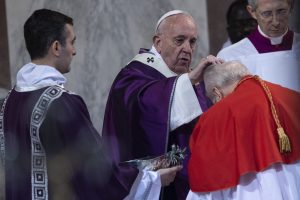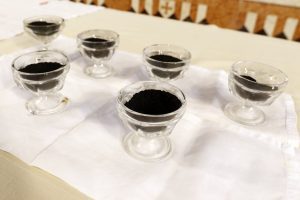The Lenten Season always has special meaning, it is a time for prayer, fasting, and almsgiving in preparation of celebrating the Paschal Mystery of our Faith.
 In the midst of ongoing impacts during the COVID-19 Pandemic, Pope Francis reminds us that it is “a favorable time to prepare to celebrate with renewed hearts the great mystery of the death and resurrection of Jesus, the cornerstone of our personal and communal Christian life. We must continually return to this mystery in mind and heart, for it will continue to grow within us in the measure that we are open to its spiritual power and respond with freedom and generosity.”
In the midst of ongoing impacts during the COVID-19 Pandemic, Pope Francis reminds us that it is “a favorable time to prepare to celebrate with renewed hearts the great mystery of the death and resurrection of Jesus, the cornerstone of our personal and communal Christian life. We must continually return to this mystery in mind and heart, for it will continue to grow within us in the measure that we are open to its spiritual power and respond with freedom and generosity.”
Lent lasts for 40 days – excluding Sundays – from Ash Wednesday (Feb. 17, 2021) to the evening Mass of the Lord’s Supper on Holy Thursday, which this year falls on April 1. It is a reminder of Christ’s 40 days of temptation and fasting in the desert, and of Israel’s 40 years of wandering in the desert.
The Season of Lent has a twofold character: first, by recalling or preparing for baptism and secondly, by penance, it disposes the faithful, who more diligently hear the word of God and devote themselves to prayer, to celebrate the paschal mystery.
Fasting, almsgiving, and prayer are the three traditional disciplines of Lent. The key to fruitful observance of these practices is to recognize their link to baptismal renewal. We recall those waters in which we were baptized into Christ’s death, died to sin and evil, and began new life in Christ. Tips to achieving this include praying the rosary, going to Mass more often, reading the Bible, and going deeper in our relationship with Christ. In addition, give alms and volunteer your time, as a way to profoundly reflect the Light of Christ while assisting our brothers and sisters in Christ.
During Lent, it is also common to participate in a retreat or pray the Stations of the Cross, allowing the opportunity for one to refocus on the Lord in different ways. While the Pandemic may have curbed some of these opportunities, please check with your local Parish for these and other Lenten activities.
At the Easter Vigil (April 3), a group of catechumens and candidates will be coming into full communion with the Church. Bishop Frank J. Dewane presides over the celebration of the Rite of Election. This annual tradition is a formal Rite during which catechumens are presented and their names are entered into the Book of Elect. Normally one ceremony takes place each year, but due to concerns related to the Pandemic, the Rite of Election in 2021 will occur in four locations over two weekends. The first pair on Feb. 21, at Epiphany Cathedral in Venice and St. Catherine Parish in Sebring, and then on Feb. 28, at Our Lady of Light Parish in Fort Myers and St. Peter the Apostle Parish in Naples.
The precept of confessing grave sins and receiving Holy Communion at least once during the Lenten Season indeed merits recalling for all the Faithful. To facilitate this requirement, every Parish in the Diocese of Venice will be open with a confessor present from 4-8 p.m., Friday, March 26, and 9 a.m. to noon, Saturday, March 27. Additional times for the Sacrament are also offered so that the Faithful may find ample opportunity to receive God’s mercy. Parishes also could combine to have an evening prayer service with additional priests present to offer the Sacrament of Reconciliation. Check with your local Parish for additional reconciliation times.
Dates of note
 On Ash Wednesday, Feb. 17, the Congregation for Divine Worship and Discipline of the Sacraments has provided guidance on the distribution of ashes amid the Pandemic. Ashes will be sprinkled on the top of the head of the faithful, rather than applying a cross on their foreheads which necessitates contact. The formula will be said only once, at the beginning of the distribution, applying it to all in general: “Remember that you are dust, and to dust you shall return.” Following this, the guidance states that the Priest then cleanses his hands, puts on a face mask and distributes the ashes to those who come forward. The Priest takes the ashes and sprinkles them on the head of each one in silence.
On Ash Wednesday, Feb. 17, the Congregation for Divine Worship and Discipline of the Sacraments has provided guidance on the distribution of ashes amid the Pandemic. Ashes will be sprinkled on the top of the head of the faithful, rather than applying a cross on their foreheads which necessitates contact. The formula will be said only once, at the beginning of the distribution, applying it to all in general: “Remember that you are dust, and to dust you shall return.” Following this, the guidance states that the Priest then cleanses his hands, puts on a face mask and distributes the ashes to those who come forward. The Priest takes the ashes and sprinkles them on the head of each one in silence.
On the Solemnity of St. Joseph, Spouse of the Blessed Virgin Mary, March 19. The Solemnity of St. Joseph comes in the midst of the ongoing Diocese of Venice “Year of St. Joseph.” Bishop Dewane consecrated Diocese to the Saint on March 19, 2020, in the context of the Pandemic. The Saint is the Protector of the Universal Church. This celebration will continue through Dec. 8, 2021 in the wake of Pope Francis’ dedicating a “Year of St. Joseph.”
On the Solemnity of the Annunciation of the Lord, March 25, many Parishes add additional Mass to accommodate this day. The day also marks the start of the annual Novena for Mass for Life, a special opportunity to meditate on the progressive development of Our Lord in His mother’s womb.
Palm Sunday of the Passion of the Lord, March 28, is the day the Church remembers Christ’s entrance into Jerusalem. The commemoration with the blessing of the palms and procession, is a ritual action that marks our own entry into Holy Week. Due to the Pandemic, great care will be taken in the distribution of the palms and will vary by Parish. Please contact your local Parish for questions.
During Holy Week, the annual Chrism Mass take place at Epiphany Cathedral at 10:30 a.m., March 30. The Chrism Mass is the largest gathering of priests in the Diocese and a time when they join Bishop Dewane in a celebration of the unity of the priesthood and when the holy oils used in the Sacraments are blessed and consecrated.
REGULATIONS ON FASTING AND ABSTINENCE
Ash Wednesday, Feb. 17, and Good Friday, April 2, are days of fast and abstinence. All Fridays of Lent are also days of abstinence from meat.
Fasting is to be observed on Ash Wednesday and Good Friday by all Catholics between the ages of 18 years and 59 years (inclusive). On a fast day one full meal is allowed. Two smaller meals, sufficient to maintain strength, may be taken according to each one’s needs, but together they should not equal another full meal. In the context of observing the fast, eating between meals is not permitted, but liquids are allowed. If possible, the fast on Good Friday is to continue until the Easter Vigil (on Holy Saturday night) as the “paschal fast” is to honor the suffering and death of the Lord Jesus, and to prepare ourselves to share more fully and to celebrate more readily His Resurrection.
Abstinence from meat is to be observed by all Catholics who are 14 years of age and older on Ash Wednesday and all Fridays of Lent, including Good Friday.
(Note: If a person is unable to observe the above regulations due to ill health or other serious reasons, they are urged to practice other forms of self-denial that are suitable to their condition.)





